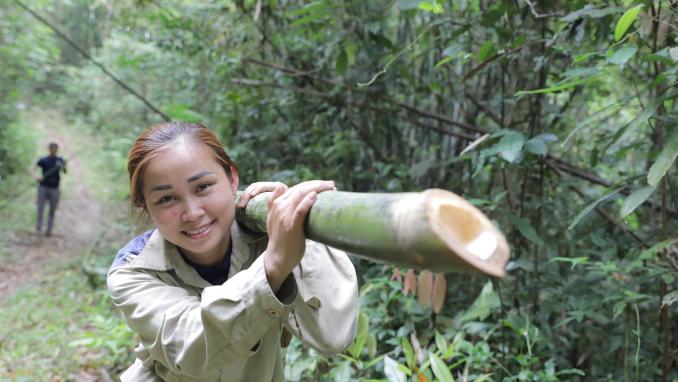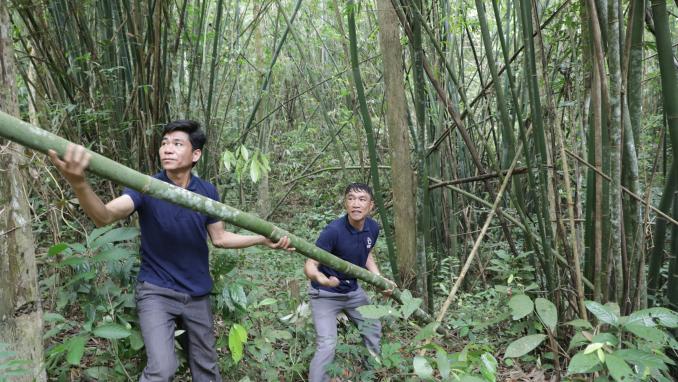“Even if we’re told to do differently now, we wouldn’t. Now we only follow sustainable standards!”
Bamboo forests blanketing the mountainous area of Que Phong, Nghe An hold the main livelihoods for most local families. So much so that the bamboo itself is hailed an “ATM machine”, dispensing cash as it is chopped and sold to merchants.
Though as vast as the eyes could see, the bamboo forests in Nghe An are on the verge of exhaustion due to indiscriminate exploitation that lacks proper planning and technique. “The size of bushes and stilts is shrinking. So are the number and quality of bamboo shoots,” – Ms. Tien sighs.
Ms. Luong Thi Tien is the leader of 40 households that grow and harvest bamboo in Muong Hinh village, Dong Van commune, Que Phong district, Nghe An. She wistfully recounts the old practice of “first seen first chopped” where all stages were manual and spontaneous; most gatherers sold their raw harvest directly to merchants. “The price fluctuated wildly. We earned merely enough to get by. We understood that our precarious exploitation greatly affected the forests, but we didn't know how we could have done better."
Ms. Tien and her loggers first heard about the FSC certificate when participating in the sustainable bamboo logging and production group, established by the “Inclusive and Sustainable Clam and Bamboo Value Chain Development in Vietnam (SCBV)” Project. The FSC certificate is issued by the World Forest Stewardship Council to encourage harvesting activities that renounce indiscriminate exploitation and stimulate the sustainable development of forests. “We were skeptical at first. The officials told us to do business sustainably, but for us, the bamboo tree has been a sustainable ATM machine for generations,” Ms. Tien recalls.
Thanks to the project's persistence and persuasion, through technical training courses and experience-sharing sessions in planting, tending, and logging bamboo following FSC standards, the people of Que Phong gradually gained confidence. According to Ms. Tien, they received thorough and wholehearted training from the experts, from how to classify and log trees by age, or how to chop close to the roots and clean up leftovers after harvesting. The project also piloted bamboo restoration tracts in several villages. “After only one season, in the worst parts of the forests, bamboo trees have revived. Seeing the result, people unanimously teach others to follow the project!" – Ms. Tien shared in excitement.
Forming new habits was baffling at first. For too long, the custom had been “chopping anything in sight.” Now the people in Que Phong have to select and log trees by age, and clean up leftovers to make room for the shoots to grow, lengthening time spent in the forest. Being the leader, Ms. Tien made it her responsibility to convince and guide people to not stray away from the rules. “It took us a while to get used to it! Now, the old practice is completely replaced by one that promotes sustainable management and logging according to international standards,” Ms. Tien smiles proudly. “The most important thing is to see my home forest reviving. Trees are large and healthy. Everyone is overjoyed!"
Efforts of harvest groups in Que Phong paid off, when 938.6 hectares of bamboo forest managed by 212 households were granted FSC certificate on February 25, 2021. This marks an important milestone for not only loggers in Nghe An but also for Vietnam's forest product industry. The FSC certificate opens doors to new opportunities. Several large enterprises in the province have offered long-term purchasing contracts and to support the whole transportation process for farmers, with a selling price 15-20% higher than selling to merchants.
“Most people now understand that certified bamboo forests bring long-term economic benefits and other sustainable environmental and social values. Even if we’re told to do differently now, we wouldn’t. Now we only follow sustainable standards!”, Ms. Tien affirmed.
Sharing her future plans, Ms. Tien hopes to receive more financial support from businesses to be able to manage forests sustainably in a closed circle. She expects that in 3-5 years, Nghe An people can form groups or cooperatives, improve their voice and become sustainable partners with businesses in the domestic and international markets.
The prolonged pandemic and lack of funds, though troubling, cannot stop Ms. Tien from being hopeful and determined as she always is. With eyes fixated on the immense forest, she beamed: "Our future stands as long as the bamboo does."


